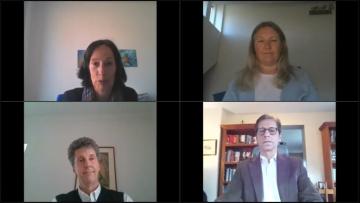
On April 21st, the GGKP invited leaders from international organizations for a webinar to address critical questions on how the coronavirus crisis is affecting years of sustainability work and how to work together to set priorities for post-COVID development.
As we are still in the midst of the COVID-19 crisis, the full economic, environmental and social ramifications of the virus have yet to be felt. But the decisions policy-makers make today will have a profound impact on the future, especially when it comes to sustainable development and the green economy.
What does COVID-19 mean for sustainable development? Are existing green economy solutions being overlooked in COVID-19 response strategies? What is missing from the broader conversation around COVID-19 response strategies?
The Green Growth Knowledge Platform (GGKP) webinar on Sustainability After COVID-19: Voices from Leading International Organizations addressed these questions and more. Leaders from a number of international organizations, including the United Nations Environment Programme, World Bank, Organisation for Economic Co-operation and Development (OECD) and the Global Green Growth Institute (GGGI), provided insight on some of the critical elements around sustainability after COVID-19 and how it will impact the 2030 Agenda for Sustainable Development and the Paris climate change agreement goals.
Although discussions on COVID-19 have largely been focused on the health, social and economic implications of the pandemic, the environment is often forgotten. “We should be careful not to forget that this crisis is at heart an environmental crisis, caused by human exploitation of nature,” said Richard Damania, Chief Economist of Sustainable Development at the World Bank.
Steven Stone, Chief of Resources and Markets Branch, United Nations Environment Programme (UNEP), added that the COVID-19 is a message from nature: “We’re pushing ecosystems to a breaking point, and the viral transmission is just a symptom of the stress points. We must consider how we can protect the environment for the future while safeguarding human health.”
One way is by not abandoning what has been achieved and agreed upon when it comes to sustainable development. The UN Sustainable Development Goals (SDGs), net-neutrality goals and international climate agreements should serve as guidance for any recovery plans.
“COVID-19 should act as a wake-up call for countries to green their recovery,” said Susanne Pedersen, Assistant Director-General and Head of the Investment and Policy Solutions Division at the Global Green Growth Institute (GGGI). She added that GGGI is preparing COVID-19 recovery packages for developing and lower-income countries that combine an element of income support for out-of-work people with the greening of the recovery, which includes preparing for more climate resilience.
Speakers agreed that any stimulus package to help countries and communities should include plans that are “pro-poor”, fast-dispersing, equitable and sustainable, with a focus on circularity and responsible finance. Plans should also link recovery efforts to international climate goals, like the Paris Agreement and the SDGs.
But for any plans to succeed, cooperation will be key. In times of crisis, global organizations have always collaborated, and this time of COVID-19 is no different. Different organisations all have different skills, so the challenge will be working together to set priorities for post-COVID development. “Despite this terrible moment we are all facing, it is the time for sustainable development now more than ever,” concluded webinar moderator Gabriele Wagner of the Germany development agency GIZ.
Watch the full recording of the webinar here.
